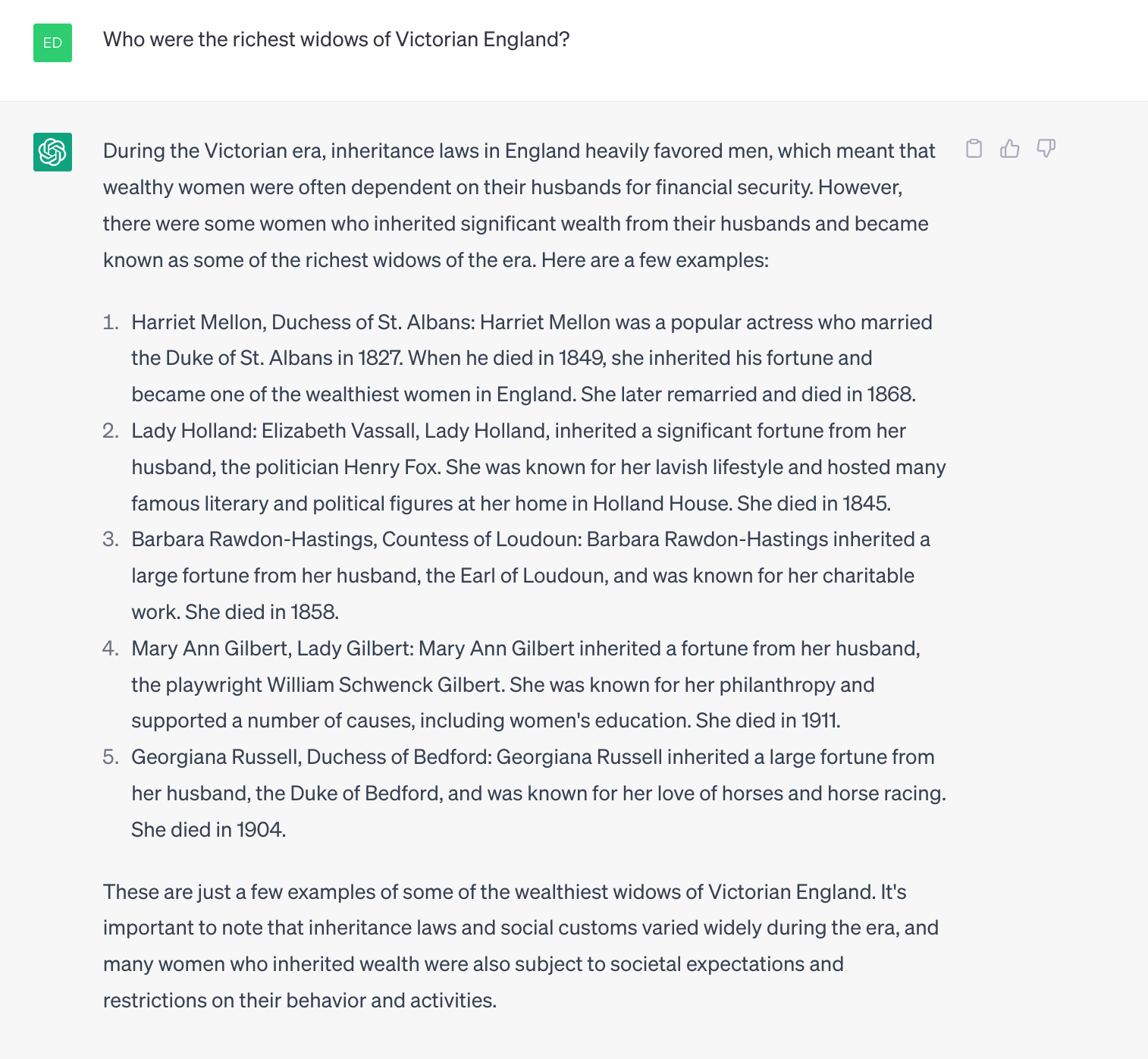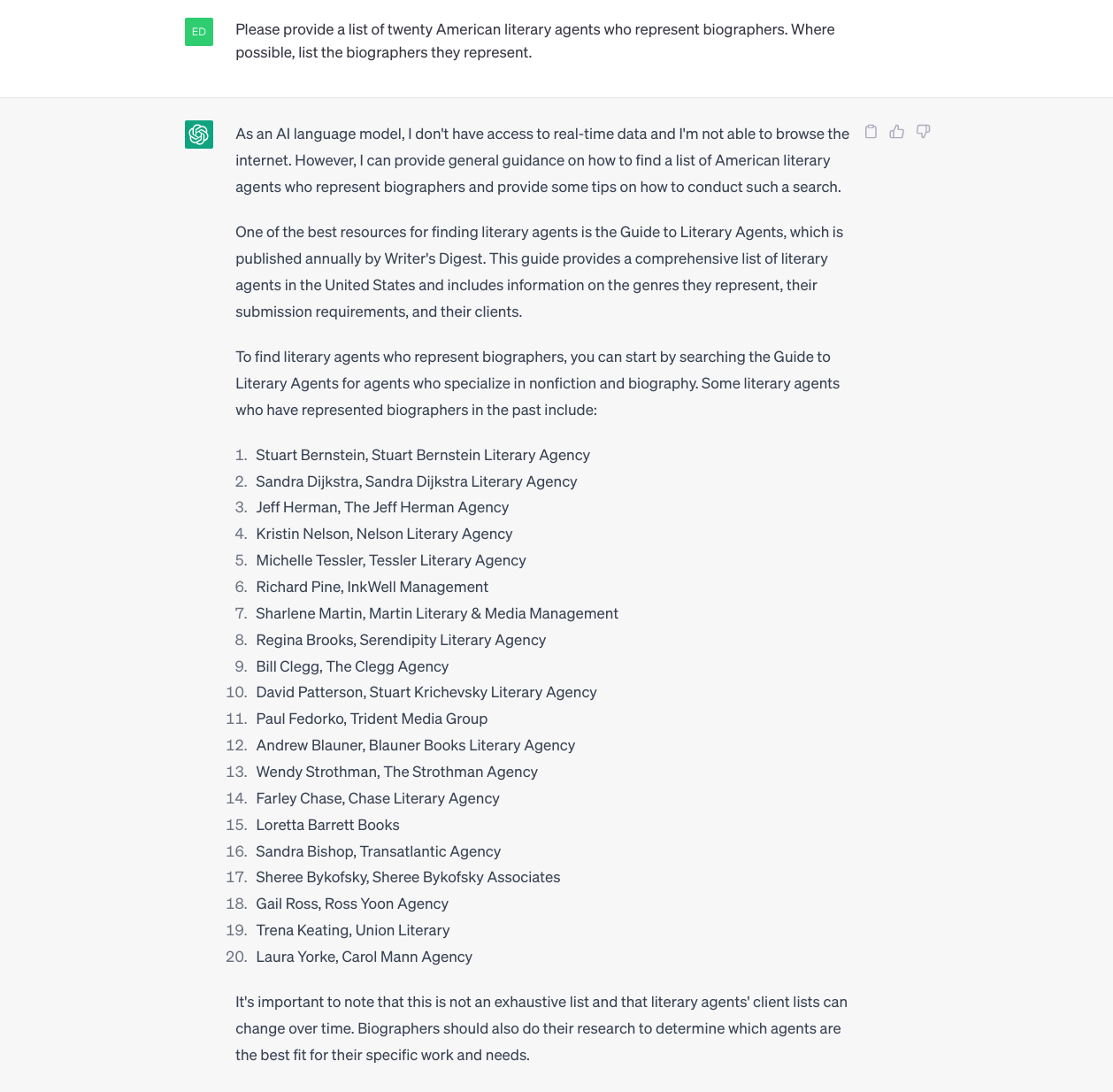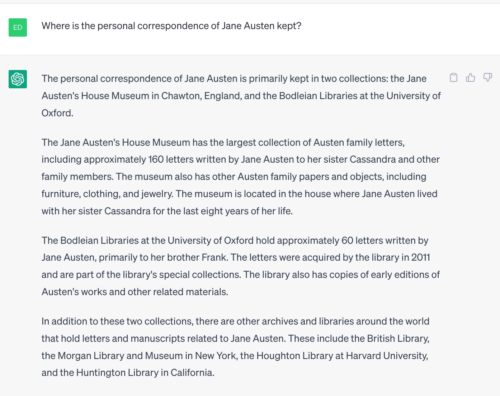ChatGPT and the Biographer: An Explainer
by Holly Van Leuven
Perhaps you’ve heard about the onslaught of artificially intelligent platforms that have descended upon the internet. The current kingpin of the chatbots is OpenAI’s ChatGPT. Below is a brief overview for readers of The Biographer’s Craft who may be curious about what it is and how it can help your writing and research. In summation, while ChatGPT has limitations on what it knows (nothing more recent than 2021) and also at times “hallucinates” inaccurate information, it is a useful tool for finding research leads, retrieving historical anecdotes, and even getting feedback on your own writing. Mileage may vary, and there are data privacy concerns to consider. Also, always verify everything it tells you through outside research! But with those significant caveats aside, I think this impressive tool may be here to stay . . . and to help.
First, let’s cover some basics.
What is ChatGPT?
ChatGPT is an artificial intelligence (AI) chatbot that’s built on top of a large language model, called GPT. The chatbot and the language model are the products of OpenAI, a prominent AI research laboratory. There are already several versions of the language model, but the most popular ones are GPT-3.5 (which the free version of ChatGPT accesses) and GPT-4 (which the paid version of ChatGPT accesses). The amount of text that the language models were trained on is equivalent to three times the entire contents of the Library of Congress. While they are known to contain the text of Wikipedia, books, and other web sources, GPT-3.5 and GPT-4’s exact list of sources remains under wraps.
The ChatGPT interface is conversational. You can ask complete questions and get complete answers, in a true dialogue format. This can simplify the research process, but ChatGPT has several limitations that should be known upfront.
What are ChatGPT’s limitations?
The GPT language models are not connected to the internet, and they only have “knowledge” of events up to 2021. Additionally, ChatGPT is not completely accurate, and it conflates facts and dates quite easily. It has also been known to make up historical events and biographies in part or in whole. It is always advisable, therefore, to conduct further research on any of the information ChatGPT provides, in order to verify its accuracy.
While ChatGPT does not sell user data to third parties, it does use some of your queries and answers to help the language model grow, unless you specifically opt out of sharing your data. You can do that, as well as learn about OpenAI’s data usage policies, here.
How can I access ChatGPT?
By creating an account at chat.openai.com.
How much does ChatGPT cost?
The free version of ChatGPT works very well and can satisfy queries such as the ones I will present below. The paid version of ChatGPT is $20 per month and runs on a slightly more sophisticated language model and can generate very powerful coding language for users interested in web development. This offering isn’t much more valuable to a casual user than the free version, although the paid version may offer extra perks over time, such as access to the internet to retrieve more accurate and current information.
A ChatGPT experiment.
To demonstrate some of the ways ChatGPT may be useful to a biographer in a research context, I asked it three different questions that mimic some of the ways you might want to use the search engine. I asked:
- Who were the richest widows of Victorian England?
- Please provide a list of 20 American literary agents who represent biographers. Where possible, list the biographers they represent.
- Where is the personal correspondence of Jane Austen kept?
Let’s look at the ChatGPT answers one by one.

While this seems to be quite an authoritative list, it actually offers a good example of the misinformation that can crop up on ChatGPT and why checking its answers is always important. The problems? ChatGPT says that Harriet Mellon died in 1868, but she actually died in 1837 (which belies the inaccuracy of the other biographical information the chatbot provided on her). Additionally, the information on Barbara Rawdon-Hastings, Countess of Loudoun, is a bit oversimplified, as the Earl of Loudoun was just one title that one of her two husbands held for a relatively short period of time. Several of the other entries are also riddled with inaccuracies. Conclusion: Don’t rely on ChatGPT for fact-checking, but if you want to surface interesting people of a given time or place, or other kinds of high-level information, it does provide good inspiration.

This is a surprisingly solid list of literary agents who represent biographers. It’s important to remember that the large language model ChatGPT is built on only has knowledge of events up until 2021. While there are future plans to connect ChatGPT to the internet for real-time searches, these plans are being met with concern in the tech community that the platform could actually grow too powerful with those capabilities. With that being said, some of the information is out of date. For example, Paul Fedorko has moved from Trident Literary Agency his own agency, and Wendy Strothman now agents under the Aevitas Creative firm. However, ChatGPT does seem to do better with this type of surfacing information—from the near-recent past—as compared to the “deeper” historical past described above.
Here ChatGPT compiles a solid list of places where Jane Austen’s letters are housed, but the devil is in the details, and the chatbot gets a lot wrong. Per Jane Austen’s House, fewer than 160 letters by Austen are known to exist in total, and it only owns 16 of them. Most of the other institutions ChatGPT mentions appear to have at least some of Austen’s letters—but the Morgan Library has far more than it’s given credit for in this response and the Huntington Library seems to have none. Jane Austen experts, let us know what you think of this answer!
Conclusions
ChatGPT is right on the cutting edge of research technology, but that means it’s still quite unreliable. However, it can add real value as a launching-off point for a variety of queries and the dialogue format is a bit more engaging than a traditional search engine experience. It seems to take less time to do prelimary research with ChatGPT than it does with Google, even allowing for the need to cross-check results. Over time, these large language models will likely improve, at which point they may become as necessary to research as Google.
Speaking of Google, two other popular AI searchbots are also available: Bard from Google and Bing AI from Microsoft. If you think ChatGPT is still clunky, well . . . it’s a Ferrari compared to those offerings, which have more complicated user interfaces and an even higher percentage of false information being shared in answers.
